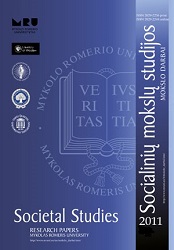Atlikėjo samprata intelektinės nuosavybės ir mokesčių bei valstybinio socialinio draudimo įstatymuose
The Concept of the Performer in the Context of Intellectual Property, Tax and Social Security Laws
Author(s): Ramūnas Birštonas, Nijolė Janina Matulevičienė, Jūratė UsonienėSubject(s): Theatre, Dance, Performing Arts, Fiscal Politics / Budgeting, Socio-Economic Research, Labour and Social Security Law
Published by: Mykolas Romeris University
Keywords: performer; author’s rights; related rights; Law on Income Tax of individuals; state social insurance;
Summary/Abstract: This article aims to analyse the concept of the performer in three different legal contexts: first, the concept of the performer in the field of intellectual property, second, the concept of the performer in the field of tax law, and third, the perception of the performer from the point of view of social insurance laws. Analysis of the performers’ concept in the legislation on intellectual property has shown that in the light of these acts the concept of “performer” has a broad sense. In the Law on Copyright the performer is perceived as every person who performs literary and artistic works. The only requirement for the performance to be protected is related to the fact that the performer has to perform literary or artistic work. Since the work is perceived in very broad sense, a big variety of acts related to entertainment and presentation are considered as subject matter of performances protection. The borderline between authors and performers is analysed in the article. Though the distinction between these two rights owners’ groups is not always evident (for example in the case of improvised performances) it has relevant legal outcome: the taxation of the performer’s and author’s income is governed by different rules, different social and health security contributions are applied to authors and to performers. The conclusion is made that the qualifying of actual subject matter of contractual relationship is essential for the correct choice of applicable tax and social insurance legal acts. The second part of the article focuses on the performer’s legal status within the meaning of law on income tax, law on health and social insurance. Despite the fact that Law on income tax defines performing activities as activities of a performing artist (actor, singer, musician, conductor, dancer or another individual acting, singing, reading, reciting or otherwise performing literary, artistic, folklore performances or circus shows), this law requires that this activity involve preparation for and participation in a public appearance. This requirement is rather unclear and raises the question if the performing activity in the meaning of tax law is perceived narrower than in the meaning of Copyright act. The notion of performing activity under the tax law is directly related to the legal position of the performer in the context of social insurance and compulsory health insurance laws, since the performing activity in these laws is defined according to the definition contained in the Law on income tax. The conclusion that the definition of performing activity in analysed legal acts should be uniformed is made.
Journal: Socialinių mokslų studijos
- Issue Year: 3/2011
- Issue No: 1
- Page Range: 231-248
- Page Count: 18
- Language: Lithuanian

